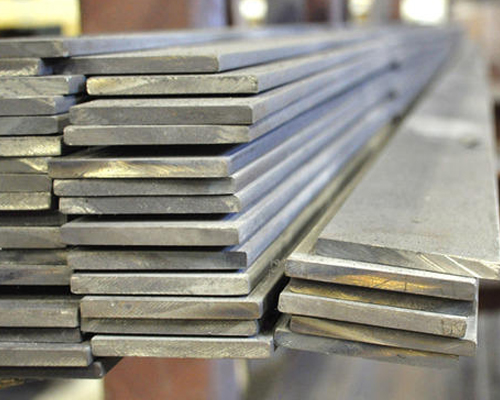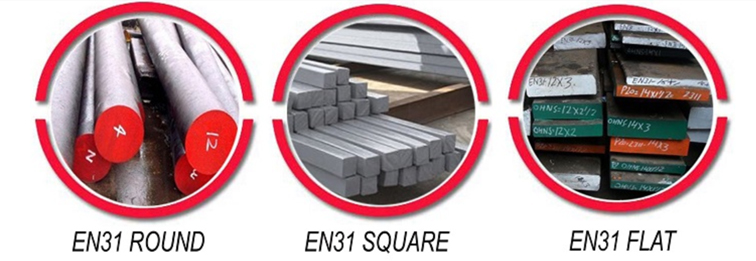EN-31
Grade Introduction
We are EN31 Round Bar manufacturers and we are only manufacturing from prime quality billets and blooms. The range of EN31 Round Bars which we manufacture for our customers are of high quality and these round bars are used for making machinery and OEM Auto components. These products have been made keeping in mind the quality parameters that have been set by the industry in the market. EN31 Round Bars are always supplied with the test certificates and can be supplied in bulk quantity as well as retail quantity as per customers’ requirements. EN31 alloy Steel round bars are supplied by us to various industries.
EN31 is a very high strength steel alloy that is hardened and tempered before supplying and has nickel, chromium, molybdenum making its high tensile steel strength, with good ductility and wear resistance. With relatively good impact properties at low temperatures, EN31 is also suitable for a variety of elevated temperature applications. EN31 round bars have good internal strength and high external strength, which makes them highly wear-resistant. EN31 steel round bars offer a good combination of ductility, strength, and wear resistance. EN31 is a very high-strength alloy engineering steel.
Grade Application:
Typical applications for EN31 steel include taps, gauges, swaging dies, ejector pins, ball, and roller bearings. It is good quality steel for wear-resisting machine parts and for press tools that do not merit a more complex quality.
Our Supply Range
Chemical Composition
The following table shows the chemical composition of EN31 steel:
| Element | C | Si | Mn | P | S | Cr |
| Content (%) | 0.95-1.10 | 0.10-0.35 | 0.40-0.70 | 0.040 Max | 0.050 Max | 1.20-1.60 |
Mechanical Properties
| ELEMENT | OBJECTIVE |
| Tensile Strength | 750 N/mm² |
| Yield Stress | 450 N/mm² |
| Reduction of Area | 45% |
| Elongation | 30% |
| Modulus of elasticity | 215 000 N/mm² |
| Density | 7.8 Kg/m3 |
| Hardness | 63 HRC |
Hardness:
63HRC
Heat treatment:
Heat treatment temperatures, including the rate of heating, cooling, and soaking times will vary due to factors such as the shape and size of each EN31 component. Other considerations during the heat treatment process including the type of furnace, quenching medium, and workpiece transfer facilities.
Hardening:
Heat slowly to the hardening temperature of 800-820°C. Maintain until thoroughly soaked through. Plenty of time must be given for this soaking and then quench in oil.
Tempering:
Temper according to the purpose for which the tools are required, generally between 150°C and 300°C. Soak well at the selected temperature and soak for at least one hour per 25mm of the total thickness. Cool slowly in the air.
| Temperature [°C] | 150 | 200 | 250 | 300 |
| Hardness [HRc] | 63-62 | 62-61 | 60-59 | 57-56 |
Physical Properties:
| NAME OF MATERIAL | COMPOSITION IN % OF WEIGHT | THERMAL CONDUCTIVITY W/M-K | DENSITY KG/M^3 | MELTING POINT | |
| C | Mn Si Cr S P Mg | ||||
| En-31 IS-103 Crl | 1.5 | 0.52 0.22 1.3 0.05 0.05 – | 46.6 | 7810 | 1540 |
Thermal Properties
| Properties | Metric | Imperial |
| Thermal expansion coefficient (@ 23-280°C/73.4- 36°F, annealed) | 11.9 µm/m°C | 6.61 µin/in°F |
| Thermal conductivity (typical steel) | 46.6 W/mk | 323 BTU in/hr.ft².°F |
Forging Properties:
Heat slowly and begin forging at 1000-1050°C. Allow sufficient time at the forging temperature for the steel to be thoroughly soaked through. Reheat as necessary and do not forge below 850°C. After forging EN31 steel, cool slowly preferably in a furnace.
Stress Relieving:
When parts are to be heavily machined, stress-relieving will be beneficial prior to hardening. Heat the EN31 carefully to 700°C, soak well and allow to cool in air.
Normalizing
EN31 alloy bearing steel is heated at 816°C followed by quenching in oil. Before performing this process, it is subjected to normalizing heat treatment at 872°C followed by slowly cooling in order to reduce the machining stress.
Annealing:
EN31 is usually supplied in the annealed and machinable conditions. Re-annealing will only be necessary if the steel has been forged or hardened. To anneal, heat the EN31 steel slowly to 800-810°C, soak well and allow it to cool in the furnace.
Density
7.81 g/cm3
Machinability:
EN31 steel is a potential member of the automobile industry, and achieving dimensional accuracy with outstanding surface characteristics is a challenging task while machining this alloy. The current investigations deal with wire electrical discharge machining (WEDM) of EN31 die steel and establish a fundamental understanding of the process parameters on micro-scale machined surface characteristics. WEDM parameters such as pulse on-time, servo voltage, wire feed, and wire tension are grouped in an efficient way to understand the influence of these parameters on edge roughness, kerf width, and cutting rate. The current study revealed that low pulse on-time and servo voltage decreased kerf width and edge roughness. However, the cutting rate decreased with pulse on-time but increased with servo voltage. Wire tension and wire feed were found to have diverse effects on the response parameters. While edge roughness varied inversely, kerf width was directly proportional to the wire feed corresponding to lower wire tension.


